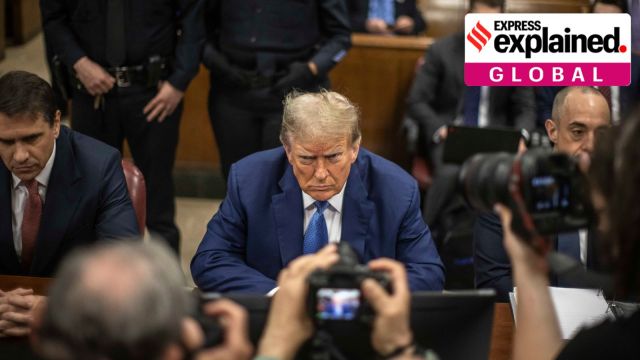What next for Trump if he loses the 2024 US presidential election?
The former President, currently indicted in four cases, awaits sentencing in one and trial in the other three. He may also be staring at likely bankruptcy if the state of his finances is anything to go by
 Former President Donald Trump attends his criminal trial at the start of the day's proceedings in Manhattan Criminal Court in New York, May 20, 2024. (Dave Sanders/The New York Times)
Former President Donald Trump attends his criminal trial at the start of the day's proceedings in Manhattan Criminal Court in New York, May 20, 2024. (Dave Sanders/The New York Times)As the US goes to vote on Tuesday (November 5), we look at how the event of a loss in the presidential race would affect Republican candidate Donald Trump legally and financially.
The status of Trump’s legal troubles
Donald Trump currently awaits trial in three cases and sentencing in a fourth. According to The New York Times, the likelihood of the former three resulting in him serving jail time could be a long shot as they may never go before a jury, or lead to a conviction.
Federal election interference case: Trump was indicted by a grand jury in August 2023 on 4 counts of conspiring to seize a second term in power, following his loss to Joe Biden in the 2020 election. Between November 2020 and January 2021, the president and his advisors entered a massive disinformation campaign, alleging voter fraud. This culminated in the events of January 6, 2021, when a mob of Trump supporters stormed the US Capitol intending to disrupt the peaceful transfer of power.
Trial in the case was paused while he appealed for presidential immunity. On July 1 this year, the US Supreme Court granted him partial immunity. The court held that the former President enjoys absolute immunity from criminal prosecution for actions done within his constitutional authority, and presumptive immunity (open to legal challenge) for official acts. There is no immunity for unofficial acts.
The SC has authorised the Columbia District Court to determine what aspects of presidential conduct could be classified as official and unofficial. This effectively made it impossible for a trial in this case to occur before Election Day. The NYT also noted that any district decision would end up back at the SC and possibly dilute the original indictment against Trump further.
Stormy Daniels Hush Money case: The former president faces the dubious distinction of being the first American president to be named a convicted felon. In May, the Manhattan Criminal Court found him guilty of 34 counts of falsifying business records to cover a hush money payment to adult film actress Stormy Daniels. This was meant to avoid the mention of a possible sex scandal from dominating the final weeks of the 2016 presidential campaign.
According to the court, Trump paid Daniels $130,000 days before the 2016 election to keep quiet on her claim that the two had a sexual encounter.
Each of the charges has a maximum sentence of four years in prison. However, Trump will likely face no prison time and being a first-time offender in a non-violent case, would be let off with a fine. In the event of an adverse immunity decision, Trump’s legal team will take the appeals route, going all the way to the Supreme Court.
Judge Juan Merchan, who presided over the case, postponed sentencing in the case to November 26, well after the election. According to The NYT, Merchan’s judicial reputation could mean Trump could be incarcerated. However, his legal team could seek house confinement as a safety measure in the wake of multiple assassination attempts, while they appeal the New York court verdict.
Federal election interference case: Trump was indicted by a grand jury of the Columbia District Court in August 2023 on 4 counts of conspiring to seize a second term in power, following his loss to Joe Biden in the 2020 election. Between November 2020 and January 2021, the president and his advisors entered a massive disinformation campaign, alleging voter fraud. This culminated in the events of January 6, 2021, when a mob of Trump supporters stormed the US Capitol intending to disrupt the peaceful transfer of power.
Trial in the case was paused while he appealed for presidential immunity. On July 1 this year, the US Supreme Court granted him partial immunity. The court held that the former President enjoys absolute immunity from criminal prosecution for actions done within his constitutional authority, and presumptive immunity (open to legal challenge) for official acts. There is no immunity for unofficial acts.
The SC has authorised the Columbia District Court to determine what aspects of presidential conduct could be classified as official and unofficial. This effectively made it impossible for a trial in this case to occur before Election Day.
Classified documents case: A federal grand jury in Miami, Florida indicted Trump in June 2023 for taking highly sensitive national defence documents from the White House after leaving office, and allegedly blocking the government’s attempts to retrieve them from his Mar-a-Lago resort.
The trial, originally scheduled for May 2024, was postponed indefinitely by District Judge Aileen Cannon, a Trump appointee. The case was subsequently dismissed in July after she ruled as unconstitutional the appointment of Special Counsel Jack Smith, who led the team of federal prosecutors.
Smith’s office has appealed this decision and wrote it “deviated” from legal precedent and “took inadequate account” of history. Even if Smith is reinstated, it could be months or years before it proceeds to trial, according to The NYT.
Georgia election interference: Trump and 18 others were indicted by an Atlanta-based grand jury in August 2023 on charges of trying to overturn his 2020 electoral defeat. These are distinct from the federal case against him, taking into light Team Trump’s aggressive efforts to change the outcome in the state. This included the former President’s phone call to Georgia Secretary of State, Brad Raffensperger to “find” 11,780 votes, the exact number that would override Biden’s victory.
Trump was originally charged with 13 counts. However, a Fulton County judge quashed three counts in March 2024, relating to soliciting violation of oath by a public officer. Two more counts were dismissed in September after the judge concluded they fell under federal jurisdiction.
On June 5, the case was indefinitely put on pause by a Georgia appeals court while a panel of judges deliberated whether Fulton County District Attorney Fani Willis should be disqualified, according to CNN. According to legal experts who spoke to The NYT, the appeal is expected to remain unaddressed till 2025 and could take another year to reach a jury.
The likelihood of Trump going bankrupt
Trump’s finances have been in trouble for a while. However, in the run-up to the 2024 election, he has thus far refused to consider bankruptcy as a solution to his cash flow problem.
A Forbes analysis on October 30 calculated that Trump currently has liabilities amounting to $1.8 billion overall. This includes $482 million in litigation fees stemming from the cases against him. If Trump loses the election, these costs are likely to rise further the longer his cases remain in trial.
In an interview with CNN on November 1, Forbes senior editor Dan Alexander said that Trump only has $400 million in cash to offset his massive share of liabilities, which continue to grow monthly.
According to Alexander, the former president could look into selling the majority of his stake – worth over $4 billion on November 1 – in Trump Media and Technology Group, which owns the right-wing social media platform, Truth Social. While it would make business sense to part with some shares and address the debt concerns, Alexander said Trump would not be interested in projecting weakness by doing so.
- 01
- 02
- 03
- 04
- 05






































